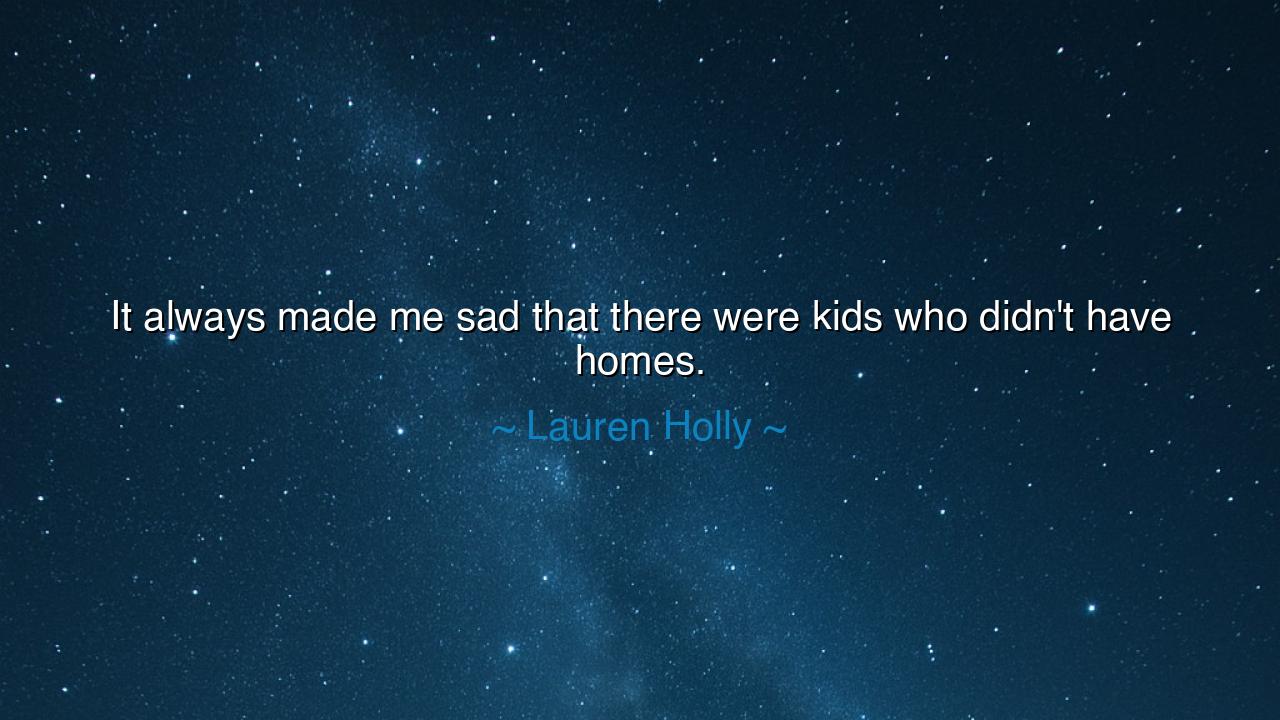
It always made me sad that there were kids who didn't have homes.






The words of Lauren Holly are tender yet piercing: “It always made me sad that there were kids who didn’t have homes.” In this brief lament is contained the sorrow of countless generations, for to be without a home is to be exiled not merely from shelter, but from belonging itself. The ancients knew that the home was more than walls and a roof—it was sanctuary, hearth, and heart. To lack such a place is not only to endure cold winds upon the body, but to endure emptiness within the soul.
Holly’s sadness is not her own alone; it is the echo of a universal grief. Every society bears within it the forgotten children, those who wander without warmth, those who lie awake with no hand to guard them. To speak of such children is to confront a failure older than kingdoms—the failure of humanity to care for its weakest. The ancients taught that a city’s strength was measured not in stone walls, but in how it treated its orphans and its poor. And yet, in every age, there are those who turn their eyes away, unwilling to face the sorrow of the homeless child.
Consider the story of the young Victor Hugo, who grew up in instability, wandering between his mother’s poverty and his father’s stern absence. Though not entirely homeless, he bore in his heart the uncertainty of fractured shelter. Later, he would write with compassion of the outcast and the wanderer, giving voice to the homeless in works such as Les Misérables. There we find the orphan Cosette, the street urchin Gavroche—children whose suffering mirrors the lament of Holly’s words. From their stories, we learn that the plight of the child without a home is not a distant tragedy, but a wound within the fabric of humanity itself.
Even in the ancient world, such children stirred the conscience of the wise. In Rome, laws were made to provide grain for the poor, and in Athens, orphans of soldiers were raised by the state. These were imperfect measures, yet they show that long ago, people recognized that to ignore the homeless child was to court dishonor upon the community. A civilization that casts aside its young is a civilization that digs its own grave, for the child is the seed of the future, and seeds cannot grow in barren ground.
The power of Holly’s words lies in their simplicity. She does not speak as a ruler or philosopher, but as a human being moved to sadness by the sight of innocence betrayed. This is the beginning of wisdom: to allow the suffering of others to pierce one’s own heart. For the first step toward justice is compassion, and the first step toward compassion is to feel sorrow when one sees another’s pain.
Therefore, let us draw the lesson: do not allow your heart to harden at the sight of the homeless. Do not explain away their plight as fate, nor push them from memory with indifference. Instead, let your sadness become action. If you cannot house every child, you can still offer food, clothing, and kindness. If you cannot solve the world’s poverty, you can still open your hand to one who stands before you. And if you are blessed with a home, honor it not with pride, but with gratitude, remembering those who long for what you possess.
Practical action lies before us all: support shelters, advocate for the forgotten, and teach your children that compassion is stronger than wealth. Invite empathy into your daily life, not only for those who stand before you, but also for those unseen, unheard, unnamed. For the mark of a noble spirit is not how high it builds its own house, but how deeply it feels the sorrow of the homeless child.
And finally, remember this: every child without a home is a silent cry to the world. If you hear it, do not turn away. Let it move you. Let it shape your choices. For in lifting the orphan, the wanderer, the forgotten, you raise not only them—you raise all of humanity closer to the light.






AAdministratorAdministrator
Welcome, honored guests. Please leave a comment, we will respond soon